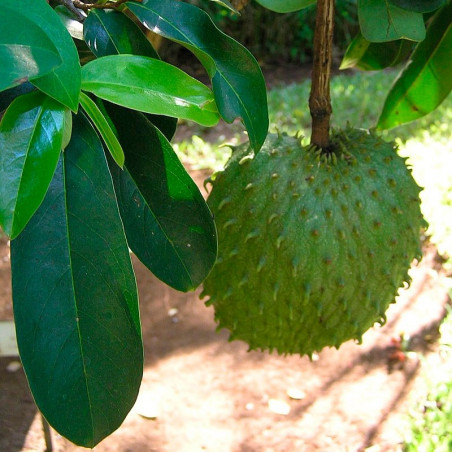





Annona muricata, commonly known as soursop, is a tropical evergreen tree that produces large fruits weighing between 1 and 5 kg. The fruit has a spiny green skin and white, juicy, aromatic flesh. Its flavor is similar to cherimoya, as both belong to the same genus. It thrives in warm, frost-free climates.
Annona muricata, commonly known as soursop, is a tropical evergreen tree from the Annonaceae family. Native to the tropical regions of the Americas, it is primarily cultivated for its fruit, which is highly valued both for its taste and its potential medicinal properties. The fruits of soursop are large, oval or round in shape, weighing between 1 and 5 kg. Its skin is thick, green, and spiny, making it easily recognizable. The inner flesh is white, juicy, and fibrous, with a flavor that combines sweet and tart notes, similar to cherimoya but with a more acidic and refreshing twist.
The tree can reach heights of 5 to 7 meters, and its leaves are large, dark green, and smooth in texture. Soursop prefers warm, humid climates and is sensitive to frost, which is why it is mainly grown in tropical and subtropical areas. In addition to its pleasant taste, soursop is known in many cultures for its medicinal properties, although scientific research on its effects and benefits is still ongoing.
In terms of cultivation, soursop requires well-drained soils and regular watering, without waterlogging. It is also important to protect the tree from strong winds, as its structure can be vulnerable. This tree is not only valuable for its fruit but also for its ability to adapt to different climatic conditions within tropical zones, making it an interesting option for both home gardens and commercial crops in warm countries.
| January | February | March | April | May | June | July | August | September | October | November | December |
Data sheet
No customer questions for the moment.